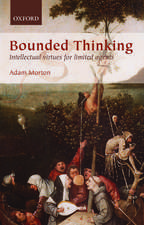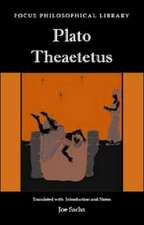Spirit: Chapter Six of Hegel's Phenomenology of Spirit: Hackett Classics
Autor Gwf Hegel Editat de Daniel E. Shannonen Limba Engleză Paperback – 14 mar 2001
This new annotated translation of Chapter Six of Hegel's Phenomenology of Spirit, the joint product of a group of scholars that included H. S. Harris, George di Giovanni, John W. Burbidge, and Kenneth Schmitz, represents an advance in accuracy and fluency on previous translations into English of this core chapter of the Phenomenology. Its notes and commentary offer both novice and scholar more guidance to this text than is available in any other translation, and it is thus well suited for use in survey courses.
| Toate formatele și edițiile | Preț | Express |
|---|---|---|
| Paperback (1) | 109.12 lei 22-36 zile | +11.65 lei 5-11 zile |
| Hackett Publishing Company, In – 14 mar 2001 | 109.12 lei 22-36 zile | +11.65 lei 5-11 zile |
| Hardback (1) | 292.34 lei 22-36 zile | |
| Hackett Publishing Company – 15 mar 2001 | 292.34 lei 22-36 zile |
Din seria Hackett Classics
-
 Preț: 65.88 lei
Preț: 65.88 lei - 15%
 Preț: 195.50 lei
Preț: 195.50 lei - 14%
 Preț: 184.08 lei
Preț: 184.08 lei - 7%
 Preț: 81.60 lei
Preț: 81.60 lei - 8%
 Preț: 345.52 lei
Preț: 345.52 lei - 7%
 Preț: 143.79 lei
Preț: 143.79 lei - 8%
 Preț: 106.45 lei
Preț: 106.45 lei - 8%
 Preț: 314.30 lei
Preț: 314.30 lei - 14%
 Preț: 171.00 lei
Preț: 171.00 lei - 11%
 Preț: 209.65 lei
Preț: 209.65 lei - 8%
 Preț: 125.82 lei
Preț: 125.82 lei - 7%
 Preț: 108.56 lei
Preț: 108.56 lei - 8%
 Preț: 309.90 lei
Preț: 309.90 lei - 9%
 Preț: 318.62 lei
Preț: 318.62 lei - 8%
 Preț: 293.06 lei
Preț: 293.06 lei - 18%
 Preț: 336.33 lei
Preț: 336.33 lei - 8%
 Preț: 292.34 lei
Preț: 292.34 lei - 8%
 Preț: 138.63 lei
Preț: 138.63 lei - 11%
 Preț: 210.28 lei
Preț: 210.28 lei - 7%
 Preț: 74.13 lei
Preț: 74.13 lei - 13%
 Preț: 263.30 lei
Preț: 263.30 lei - 13%
 Preț: 262.04 lei
Preț: 262.04 lei - 8%
 Preț: 85.81 lei
Preț: 85.81 lei - 12%
 Preț: 269.79 lei
Preț: 269.79 lei - 7%
 Preț: 101.44 lei
Preț: 101.44 lei - 8%
 Preț: 92.26 lei
Preț: 92.26 lei - 14%
 Preț: 183.57 lei
Preț: 183.57 lei - 9%
 Preț: 304.37 lei
Preț: 304.37 lei - 8%
 Preț: 294.64 lei
Preț: 294.64 lei - 14%
 Preț: 171.16 lei
Preț: 171.16 lei - 7%
 Preț: 128.27 lei
Preț: 128.27 lei - 8%
 Preț: 299.09 lei
Preț: 299.09 lei - 13%
 Preț: 264.76 lei
Preț: 264.76 lei - 8%
 Preț: 332.07 lei
Preț: 332.07 lei - 13%
 Preț: 246.98 lei
Preț: 246.98 lei - 13%
 Preț: 243.54 lei
Preț: 243.54 lei - 8%
 Preț: 331.87 lei
Preț: 331.87 lei - 8%
 Preț: 310.67 lei
Preț: 310.67 lei - 7%
 Preț: 323.40 lei
Preț: 323.40 lei - 13%
 Preț: 265.61 lei
Preț: 265.61 lei - 13%
 Preț: 175.48 lei
Preț: 175.48 lei - 8%
 Preț: 327.47 lei
Preț: 327.47 lei - 13%
 Preț: 231.00 lei
Preț: 231.00 lei - 13%
 Preț: 243.18 lei
Preț: 243.18 lei
Preț: 109.12 lei
Nou
Puncte Express: 164
Preț estimativ în valută:
20.89€ • 22.70$ • 17.56£
20.89€ • 22.70$ • 17.56£
Carte disponibilă
Livrare economică 31 martie-14 aprilie
Livrare express 14-20 martie pentru 21.64 lei
Preluare comenzi: 021 569.72.76
Specificații
ISBN-13: 9780872205697
ISBN-10: 087220569X
Pagini: 256
Dimensiuni: 9 x 215 x 139 mm
Greutate: 0.28 kg
Editura: Hackett Publishing Company, In
Colecția Hackett Publishing Company, Inc.
Seria Hackett Classics
ISBN-10: 087220569X
Pagini: 256
Dimensiuni: 9 x 215 x 139 mm
Greutate: 0.28 kg
Editura: Hackett Publishing Company, In
Colecția Hackett Publishing Company, Inc.
Seria Hackett Classics
Recenzii
One problem in teaching Hegel's Phenomenology of Spirit is the sheer size of the work, which makes it intractable within the time limits of the typical North American university semester course. The judicious instructor can use this pivotal Chapter Six of the book as a vehicle for summing up the themes that Hegel has been developing from the beginning, and for anticipating the conclusion to which they lead. Students are more likely to grasp the substance of the work by this method than by the usual practice of concentrating on the Preface and the first three Chapters. Most misunderstandings of Hegel are due to the limitations of precisely this practice. Chapter Six is a literary and philosophical masterpiece in its own right. I cannot think of any more perceptive synthetic view of the development of European culture than is contained here. --George di Giovanni, McGill University


















